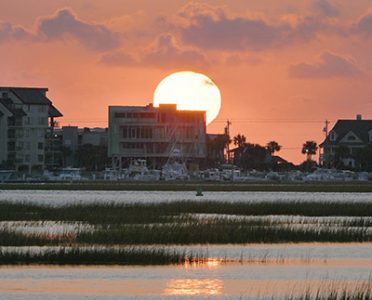Land use
Judge upholds county approval of marina building

Georgetown County’s approval of a new store and restaurant at Marlin Quay Marina did not violate state and local law, a Circuit Court judge ruled last week.
The decision by Judge R. Kirk Griffith came more than six years after the first plans for the project were challenged by the owners of the neighboring Gulfstream Café and five months after the case went to trial.
“The burden of proving a zoning ordinance to be invalid is on the party who brings the action; to attack it, they must show the arbitrary and capricious nature of the ordinance through clear and convincing evidence,” Griffin said in his ruling, citing state Supreme Court decisions. “Here, Plaintiffs have not overcome the presumption that [the approval] was so unreasonable as to impair or destroy constitutional rights.”
At the trial late last summer, Gulfstream’s attorney argued that the approval of the new facility would overwhelm the available parking and amount to an unconstitutional taking of the café property.
The county’s attorney said the suit was part of an effort to stifle competition.
Marlin Quay is a “planned development” that was created in 1982. It includes the marina, the café and condos. When Jerry Greenbaum bought Gulfstream in 1986, he got an easement to use the shared parking lot.
Palmetto Industrial Development, whose principal is Mark Lawhon, bought the marina in 2014. He tore down the existing store and restaurant in November 2016.
Gulfstream went to court to block the project, known in court records as 1.0, which was approved as a “minor change” to the planned development that only required staff approval. The county Board of Zoning Appeals backed the approval, but Palmetto agreed to submit the project as a “major change” with a public hearing before the Planning Commission and three readings by County Council.
The new facility was designed by SGA Architecture, the firm owned by Council Member Steve Goggans. He represented Palmetto in conversations with planning staff and appeared at the appeals board hearing, prompting a complaint to the state Ethics Commission that resulted in a warning and a fine.
At the trial last year, attorney Simon Bloom called Goggans’ role “the infection of this ordinance” and argued that it tainted the process that led to the final approval of the marina building. “This is the core of our case,” he said.
While the six other council members who approved the change to the planned development were dropped from the suit as individuals, Goggans remained a defendant individually and in his official capacity.
Goggans recused himself when Marlin Quay appeared before council for a “major change” to the development, known as 2.0 in court filings.
After that was approved in February 2018, a Circuit Court judge ruled in a suit brought by Gulfstream alleging that Palmetto had interfered with its easement that the new marina building could not extend beyond the footprint of the original building.
That led to the plan known as 3.0, which passed in January 2019. Through all versions, the project contained 4,596 heated square feet with restaurant seating limited to 110 people.
“While Goggans was involved in the creation of 1.0, there is no evidence that he was involved in 2.0 or 3.0,” Griffin said in his ruling.
Boyd Johnson, the former county planning director, and Holly Richardson, the current planning director, testified that they were not pressured or influenced by Goggans.
“The decision was not arbitrary or capricious; the county council voted on this amendment without Goggans partaking in any of the votes or the public readings,” Griffin said.
“I was certainly pleased, but not surprised,” Goggans said of the ruling. “I made an accidental, a naive appearance at an appeals board hearing. Other than that, there’s really nothing to point to, but they seized on that.”
Bloom did not reply to an email seeking comment on the ruling.
Although Gulfstream argued that the county failed to provide proper notice of the change to the Marlin Quay planned development, Griffin noted that the café was represented at all the hearings.
He rejected Gulfstream’s claim that the county should have applied its current zoning standards to the new marina building.
Johnson and Richardson testified that “a PD is a zoning variance, where the code is a guideline, and not a requirement. Plaintiff did not offer any experts on zoning or planning and did not offer any evidence that said otherwise,” Griffin said in his ruling.
Approval of the new building also brought the facility into compliance with federal flood regulations and current building codes. “The decisions made by the County in regards to the amendments were not completely baseless,” Griffin said.
As to the claim of a taking, the judge ruled that Gulfstream’s interest in the property – the easement for access to the parking lot – had not changed.
“Customers and patrons of Plaintiff still have the ability to use the parking lot. Plaintiff presented no evidence that all economically beneficial use of the land has been deprived, merely that customers may experience difficulty when parking in the parking lot,” Griffin said. And he added, “Plaintiff’s own witnesses testified that parking has always been a problem.”
Since the claim of a taking was not supported, Gulfstream’s argument that the approval of the building amounted to “inverse condemnation” also failed, the judge said.
Since Gulfstream didn’t prevail on any of its arguments, “the Plaintiff is not entitled to attorney’s fees,” Griffin said.




